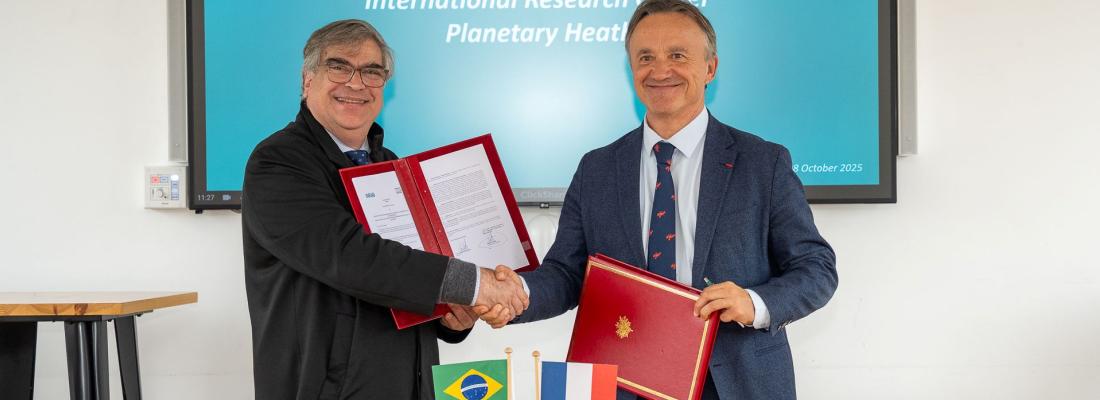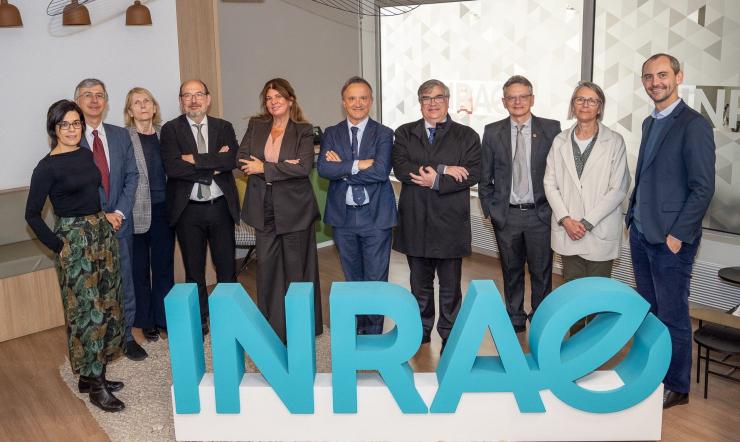Reading time 4 min
INRAE and the University of São Paulo establish an International Research Center on Planetary Health
PRESS RELEASE - Just days before the opening of the COP30, Philippe Mauguin, Chair and CEO of INRAE, and Carlos Gilberto Carlotti Junior, President of the University of São Paulo (USP), announce the creation of the International Research Center (IRC) “Planetary Health”, a joint international laboratory dedicated to exploring the interconnections between human, animal, plant, and environmental health. In the face of climate disruption, biodiversity loss, and emerging health risks, INRAE and USP—longstanding scientific partners—are strengthening their collaboration by placing the sustainability of agriculture and the environment at the heart of human health. The center will bring together over one hundred French and Brazilian researchers from the natural, medical, social, and political sciences. Based in Piracicaba (State of São Paulo), and co-directed by two scientists from INRAE and USP, this initiative will be the first international research center established by INRAE and the fourth recognized at USP.
Published on 27 October 2025

Located in Piracicaba, on the campus of the Luiz de Queiroz College of Agriculture (ESALQ) at USP, the center will be co-directed by Anne-Nathalie Volkoff, research director and crop pest specialist at INRAE, and Fernando Consoli, director of the Department of Entomology and Acarology at ESALQ. It will mobilize over one hundred researchers from both institutions around a common scientific strategy.
A Research Program Structured Around Five Thematic Pillars
• Sustainable production systems: agroecology, biocontrol, functional biodiversity.
• Adaptation to climate change: genetics, modeling, carbon management.
• Responsible resource use: water, soil, circular bioeconomy.
• Food systems and preventive nutrition: healthy and sustainable diets.
• Digital agriculture and food systems: data, robotics, AI, and digital twins.
Building on Strong Institutional and Scientific Collaboration
The program will build on existing collaborations between USP—the top university in Brazil according to the Shanghai ranking—and INRAE, the world’s leading research organization specializing in the agriculture–food–environment continuum. Since 2017, more than 430 joint scientific publications have been produced in fields such as ecology, environment, microbiology, food science, and forestry.
At the institutional level, the two organizations have been consolidating their partnership since 2018 through a Memorandum of Understanding (MoU)—renewed in 2024—and the creation of two International Associated Laboratories (LIA) in 2025[1].
Objectives of the International Research Center
• Develop integrated scientific approaches linking agricultural production, environment, food, and health.
• Build a sustainable Franco-Brazilian research network between both institutions and their partners.
• Support the joint training and mobility of young researchers (PhD, postdoc).
• Promote innovative solutions for sustainability, food security, and health risk prevention.
This initiative reinforces the Franco-Brazilian research strategy on the bioeconomy announced by the Presidents of Brazil and France in Belem in March 2024.
[1] the LIA LEARN (Laboratory for Enhanced Agricultural Resilience through Multi-Organism Interaction Analysis), coordinated by INRAE, and the LIA AgriWalue (Valorisation of Agricultural and Agro-industrial By-Products and Wastes Towards a Circular Bioeconomy), coordinated by AgroParisTech with INRAE as a partner.
“By consolidating more than fifteen years of collaboration between our French and Brazilian teams, the IRC ‘Planetary Health’ becomes an open platform for research and innovation on ecological, food and health transitions, and the adaptation of agriculture to climate change. It embodies INRAE and USP’s shared commitment to thinking and acting together for the health of the planet”, stated the chair and CEO of INRAE, Philippe Mauguin.
“This new center marks an important partnership with INRAE, one of France’s leading research funding agencies in the field of agriculture. Located in Piracicaba, the center will foster cutting-edge studies in collaboration with Esalq — currently INRAE’s main partner in Brazil — as well as with the Center for Nuclear Energy in Agriculture, the School of Veterinary Medicine and Animal Science, and The School of Animal Science and Food Engineering. It will also engage other USP schools and research units that work in the field of food science, such as the School of Public Health and the School of Pharmaceutical Sciences. The initiative will certainly create an international environment for our researchers and allow the development of new collaborative projects. I am certain that this will be a very enriching joint effort with INRAE, one that will further highlight the strength of our University in scientific production and in developing solutions related to the five pillars of the new center », said the president of USP, Carlos Gilberto Carlotti Junior.
Expected Recognition and Long-Term Impact
The recognition of the IRC “Planetary Health” by FAPESP—the São Paulo Research Foundation—is expected at a later stage. It would open the way to a 30-million-real grant over five years, supporting the center’s operational launch in 2026 through joint projects, scientific mobility programs, and the organization of summer schools and international symposia. Within five years, as well as co-publications and researcher training, major impacts are expected in economic, technological, environmental, social, and health terms, driven by multidisciplinary research and innovation.
[1] le LIA LEARN - Laboratory for Enhanced Agricultural Resilience through Multi-Organism Interaction Analysis, coordonné par INRAE; et le LIA AgriWalue - Valorisation of Agricultural and Agro-industrial By-Products and Wastes Towards Circular Bioeconomy, coordonné par AgroparisTech et INRAE partenaire.

